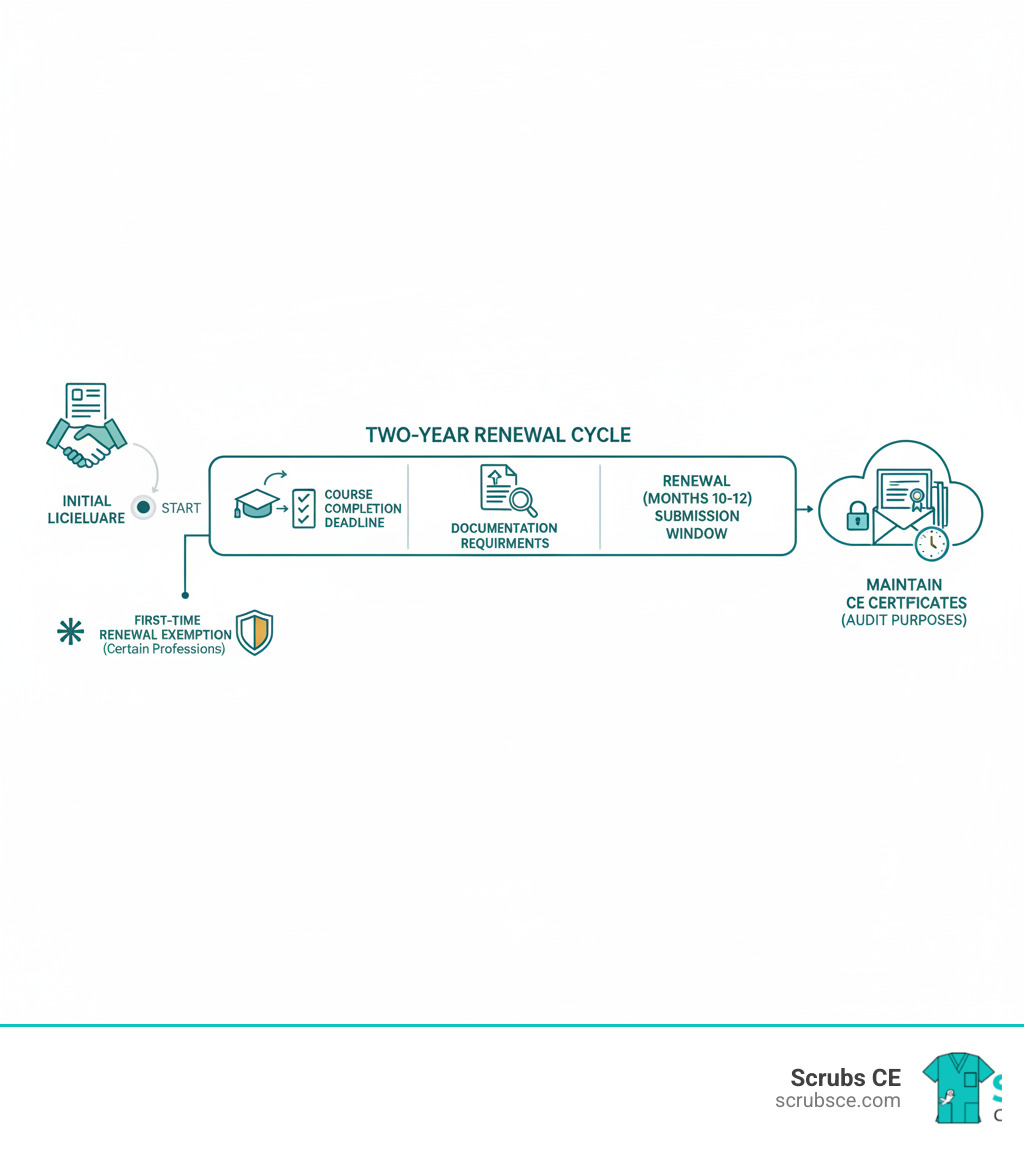Why California CE Requirements Matter for Your License
California CE requirements vary by profession, but nearly all licensed healthcare providers must complete continuing education every two years to maintain an active license. Understanding your specific obligations is essential to avoid license suspension or renewal delays.
Quick Overview by Profession:
| Profession | CE Hours Required | Renewal Period | Key Mandatory Topics |
|---|---|---|---|
| RN, APRN, LVN, PT | 30 contact hours | Every 2 years | Implicit bias (1 hr, one-time) |
| Pharmacist | 30 hours | Every 2 years | Law & Ethics webinars, Cultural competency |
| Dentist | 50 units | Every 2 years | Infection Control, Dental Practice Act, Opioid Prescribing, BLS |
| MD | 50 hours (AMA PRA Category 1) | Every 2 years | Pain management, DEA SUD training (8 hrs, one-time) |
| DO | 50 hours (20 AOA Category 1A/1B) | Every 2 years | Pain management, DEA SUD training (8 hrs, one-time) |
| Respiratory Care Practitioner | 30 hours | Every 2 years | Clinical Practice (15 hrs), RCP Leadership (10 hrs) |
| Optometrist (TPA-Certified) | 50 hours | Every 2 years | Ocular disease (35 hrs) |
| Veterinarian | 36 units | Every 2 years | Self-study limit: 6 units |
California’s CE landscape is complex, as each licensing board sets its own rules for required hours, mandatory topics, and approved providers. For example, nurses have a one-time implicit bias training requirement, while dentists must take specific courses on infection control and the Dental Practice Act. This guide breaks down the CE requirements for California’s major healthcare professions, helping you understand exactly what you need to do to stay licensed.
General CE Compliance: What Every California Healthcare Professional Should Know
While California CE requirements seem overwhelming, most follow a similar framework. Understanding these general rules will help you stay compliant, regardless of your license.
Most California healthcare licenses use a two-year renewal cycle, giving you 24 months to complete your required CE. The key is organization: track your courses, verify providers are approved by your board, and keep detailed records in case of an audit.
Record-keeping is critical. Save every certificate of completion. Most boards require you to retain this documentation for several years (e.g., four years for nurses and pharmacists, three renewal periods for dentists). Store them in a safe physical or digital folder. You don’t want to be scrambling for old emails during an audit.
California licensing boards conduct random compliance audits to verify CE completion. If selected, you’ll receive a notice to submit copies of your certificates. For nurses, Title 16, California Code of Regulations, Sections 1451(c) and (d) makes it clear all RNs are subject to audits. Failure to comply can result in fines or disciplinary action.
First-time renewals often come with exemptions. Many boards, including those for RNs and pharmacists, exempt newly licensed professionals from CE during their first renewal. Respiratory Care Practitioners have reduced requirements (15 hours instead of 30). However, these exemptions are not universal, so always verify with your specific board.
Exemptions or extensions may be available for circumstances like physical disability, prolonged illness, or caring for a disabled family member. Active-duty military personnel practicing outside California may also qualify for exemptions or military fee waivers.
Key Steps for Meeting California CE Requirements
- Verify Provider Approval: Before enrolling, confirm the provider is approved by your specific California licensing board. Many boards recognize national accreditors like ACCME, ACPE, or ANCC. Use the DCA License Search tool to check a provider’s status.
- Understand Course Formats: Boards have different rules for in-person, live online, and self-study courses. Live courses involve real-time instructor interaction (in-person or webinar), while self-study courses are pre-recorded or text-based.
- Check Self-Study Limits: Many professions limit the number of CE hours you can earn through self-study. For example, dentists cannot exceed 50% of their required units from non-live courses, and veterinarians are limited to six units.
- Certify, Don’t Submit: You typically don’t submit certificates with your renewal. Instead, you certify under penalty of perjury that you’ve completed the hours. This is why record-keeping is vital—you must be able to prove it if audited.
Specialized and Mandatory Training Topics
California requires training on several critical public health topics, often across multiple professions.
- Implicit Bias: A one-hour, one-time training is required for many healthcare professionals, per AB 1407. For RNs, this is required during the first renewal, even if otherwise exempt from CE.
- Ethics: Pharmacists must complete two hours of mandatory law and ethics webinars issued directly by the Board of Pharmacy.
- Pain Management: Physicians (MDs and DOs) have a one-time requirement covering pain management, end-of-life care, and the addiction risks of Schedule II controlled substances.
- Cultural Competency: Pharmacists and pharmacy technicians must complete one hour of CE on cultural competency, addressing health disparities and care for diverse populations.
- Opioid Prescribing: Dentists must complete a two-unit course on prescribing Schedule II opioids to address the opioid crisis.
California CE Requirements for Medical and Healthcare Professionals
Now that we’ve covered the general rules, let’s get specific. California CE requirements vary significantly by license type.
Nursing (RN, APRN, LVN, PT)
Nurses (RN, APRN, LVN, PT) must complete 30 contact hours every two years. Keep your CE certificates for four years for potential audits.
- First Renewal: You are exempt from the 30-hour requirement if it’s your first renewal within two years of passing your licensing exam.
- Implicit Bias: A one-time, one-hour implicit bias training is mandatory for all, even first-time renewers, per
[AB 1407](https://leginfo.legislature.ca.gov/faces/billNavClient.xhtml?bill_id=202120220AB1407). - NPs and Gerontology: Starting Jan 1, 2025, NPs whose patient base is at least 25% seniors (65+) must ensure 20% of their CE (6 hours) is in gerontology or dementia care.
- Prescriptive Authority: NPs need 3 hours on Schedule II controlled substances. Certified Nurse Midwives (CNMs) need 2 hours covering neonatal abstinence syndrome.
- DEA Requirement: All DEA-registered practitioners must complete a one-time 8-hour course on substance use disorders (SUDs).
- Licensed Midwives (LMs): Require 36 contact hours every two years.
For the latest, visit the [Continuing Education for License Renewal](https://www.rn.ca.gov/licensees/ce-renewal.shtml) page from the [California Board of Registered Nursing](https://www.rn.ca.gov).
Physicians (MD & DO)
Physicians must complete 50 hours of CE every two years.
- MDs: Require 50 hours of AMA PRA Category 1 Credit™ from ACCME-accredited providers.
- DOs: Require 50 hours, with at least 20 hours of AOA Category 1A or 1B credit.
- Pain Management: A one-time 12-hour training in pain management and end-of-life care is required within four years of licensure or by the second renewal.
- Geriatric Care: General internists and family physicians with a patient base of 25% or more seniors (65+) must complete 20% of their CME (10 hours) in geriatric medicine or dementia care.
- DEA Requirement: A one-time 8-hour training on SUDs is required for all DEA-registered practitioners.
- Radiology/Fluoroscopy Permits: Holders of these permits have additional, specific CE requirements.
Check the [MD License Renewal Instructions](https://www.mbc.ca.gov/Licensees/License_Renewal/Physicians_and_Surgeons.aspx) for current information.
Dentists and Dental Auxiliaries (RDA, RDH)
CE requirements are for a two-year renewal period. Keep records for three renewal periods.
- Dentists: 50 CE units.
- RDA, RDH, and other auxiliaries: 25 CE units.
Mandatory Courses for All:
- Infection Control: 2 units, board-approved.
- Dental Practice Act: 2 units, board-approved (includes ethics).
- Basic Life Support (BLS): Must include a live, in-person skills session. Max 4 units.
- Opioid Prescribing (Dentists only): 2 units on prescribing Schedule II opioids.
Limitations:
- No more than 50% of total CE can be from non-live courses (correspondence/self-study).
- No more than 20% of total CE can be for practice management or business-related topics.
Visit the [Dental Board of California CE Info](https://dbc.ca.gov/licensees/continuing_education.shtml) for details.
Pharmacists and Pharmacy Technicians
Pharmacists and technicians must complete CE every two years and retain certificates for four years.
- Pharmacists: 30 hours.
- Advanced Practice Pharmacists (APh): 40 hours (10 must be relevant to clinical practice).
- First Renewal: Exempt from CE requirements.
Mandatory Topics:
- Law & Ethics: Two hours must come from mandatory Board-issued webinars.
- Cultural Competency: One hour is required for all renewals after Jan 1, 2024.
CE must be from providers recognized by ACPE or CPhA. For full details, see the [Continuing Education Information - CA State Board of Pharmacy](https://pharmacy.ca.gov/licensees/personal/ce.shtml).
Respiratory Care Practitioners (RCPs)
As of January 1, 2024, RCPs need 30 hours of CE for renewal.
- Breakdown: 15 hours in clinical practice, 10 hours in RCP leadership, and 5 flexible hours.
- Live Requirement: At least 15 of the 30 hours must be from live courses (in-person or interactive online).
- First Renewal: Only 15 hours are required.
Find specifics on the [RCP Continuing Education](https://rcb.ca.gov/licensees/ce.shtml) page.
Radiologic and Imaging Professionals
California CE requirements for radiologic technology vary significantly based on the specific licenses and permits you hold. Your CE must be approved by the CDPH Radiologic Health Branch (RHB).
- X-Ray Technologists: See our guide on
[How to Maintain Your X-Ray License in California](https://scrubsce.com/how-to-maintain-your-x-ray-license-in-california/). - Fluoroscopy Permit Holders: Learn more in our article on
[California Fluoroscopy License Renewal](https://scrubsce.com/california-fluoroscopy-license-renewal-how-to-maintain-your-fluoroscopy-permit-in-the-state-of-california/). - Nuclear Medicine Technologists: We answer your questions here:
[What are Continuing Education Requirements for Certified Nuclear Medicine Technologists in the State of California?](https://scrubsce.com/what-are-continuing-education-requirements-for-certified-nuclear-medicine-technologists-in-the-state-of-california/). - Multiple Permits: Our
[California Combos](https://scrubsce.com/california-combos/)page helps clarify overlapping requirements.
CE Requirements for Other Healthcare-Related Professions
California’s CE rules extend to a diverse range of professions, including those who care for animals and help people see clearly.
Veterinarians and RVTs
Veterinarians and Registered Veterinary Technicians (RVTs) must complete CE for each renewal cycle.
- Veterinarians: 36 units required.
- RVTs: 20 units required.
There are limits on self-study (any learning without a live instructor): six units for veterinarians and four units for RVTs. A unique option allows veterinarians to earn CE credit for providing [pro bono spay/neuter services](http://leginfo.legislature.ca.gov/faces/codes_displaySection.xhtml?sectionNum=4846.5.&lawCode=BPC) at qualified shelters, a great way to fulfill requirements while supporting animal welfare.
Optometrists
For optometrists, California CE requirements depend on your certification level.
- TPA-Certified: 50 hours every two years, with 35 hours focused on ocular disease.
- Non-TPA Licensed: 40 hours every two years.
- Glaucoma Certification: Requires 10 hours of glaucoma-specific CE, which counts toward the 35-hour ocular disease requirement.
Up to 25 hours can be completed through self-study or correspondence courses. New licensees may be exempt for their first renewal if licensed within one year of graduation. For a complete breakdown, consult the [Optometrist CE Fact Sheet](https://www.optometry.ca.gov/formspubs/ce-fact-sheet.pdf).
Frequently Asked Questions about California CE
Navigating California CE requirements can be tricky. Here are answers to some common questions.
What happens if I am audited for CE compliance?
First, don’t panic. An audit is a routine spot-check, not a punishment. Your licensing board will send a notification by mail with instructions and a deadline. You will be asked to submit copies of your CE certificates proving you completed the required hours.
This is why record retention is crucial. You must be able to produce documentation for the required period (e.g., four years for nurses per [Title 16, California Code of Regulations, Sections 1451(c) and (d)](https://govt.westlaw.com/calregs/Document/IF63826D34C8111EC89E5000D3A7C4BC3?viewType=FullText&originationContext=documenttoc&transitionType=CategoryPageItem&contextData=(sc.Default)), and three renewal periods for dental professionals). Failure to provide proof can lead to fines, probation, or license suspension. If you’ve kept organized records, an audit is a simple process.
Are there exemptions for first-time license renewals?
Yes, but it varies significantly by profession. You cannot assume you are exempt.
- Registered Nurses are generally exempt from the 30-hour requirement for their first renewal but must still complete the one-hour implicit bias training.
- Pharmacists are fully exempt from CE during their first renewal period.
- Respiratory Care Practitioners have a reduced requirement of 15 hours instead of 30.
- Optometrists licensed within one year of graduation are exempt for their first renewal.
The golden rule: Always check directly with your specific licensing board to confirm your eligibility for any exemption.
Can I use courses from other states for my California CE requirements?
Often, yes. Many California boards accept courses from nationally recognized accrediting bodies, making it easier for those licensed in multiple states. For example:
- Physicians: The Medical Board accepts courses awarding AMA PRA Category 1 Credit™.
- Nurses: Courses approved by the ANCC are generally accepted.
- Pharmacists: Courses from ACPE-accredited providers are accepted.
However, be aware of California-specific requirements. For instance, the California Board of Pharmacy requires pharmacists to complete Board-issued law and ethics webinars that cannot be substituted. Some boards, like the Dental Board, may allow you to petition for credit for an unapproved course by submitting detailed documentation.
The best approach is to verify before you enroll. Check your board’s website or contact them directly to ensure a course and provider are accepted for your California license renewal.
Conclusion: Simplify Your California CE Compliance
Keeping up with California CE requirements is complex, with varying hours, mandatory topics, and board-specific rules. Compliance is your responsibility.
Proactive planning is the key to avoiding stress. Know your renewal date, identify your specific requirements, and choose courses from board-approved providers. Most importantly, keep every certificate in a safe, organized place. Future-you will be grateful if an audit notice arrives.
We created Scrubs CE to simplify this process. Our online continuing education courses are convenient, affordable, and designed to meet the specific requirements of California licensing boards. With a self-paced format and instant certificates, you can learn on your schedule and get the proof of completion you need without delay.
Your commitment to ongoing learning is an investment in your career and in better patient care. By staying informed and planning ahead, you can meet your obligations with confidence.
Ready to tackle your CE requirements? [Explore our X-Ray CEU courses to meet your California requirements](https://scrubsce.com/category/x-ray-ceu/) and see how straightforward continuing education can be.





Recent Comments